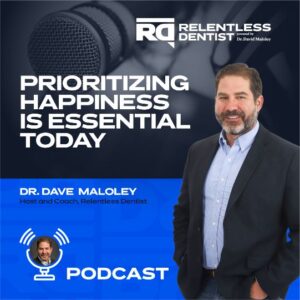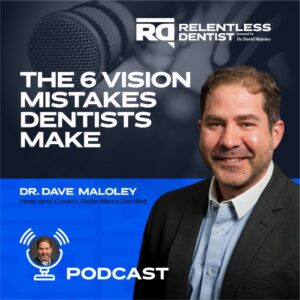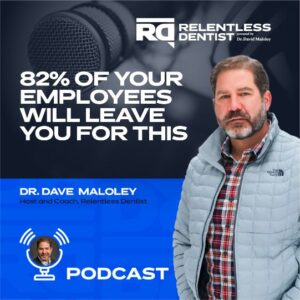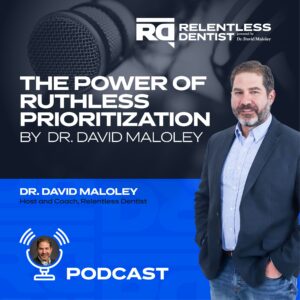by [email protected] | Jun 23, 2021 | Prescriptions for your Practice
Podcast: Play in new window | Download

Prioritizing Happiness Is Essential Today
Money won’t make you happy, but happiness will make you money.
At this point in your life, you must be able to distinguish pleasure from happiness. Although both bring joy and good feelings, they produce contrasting outcomes. Pleasure is momentary and visceral, while happiness is long-lasting and transcendental.
Listen in as I dig deeper into the realities of happiness. We will talk about positive psychology and the narcissism epidemic brought about by the disruption in social media. We’ll also look at how we can prioritize happiness, what it looks like tactically, and what you can do to guarantee a culture of happiness in your practice.
Tune in and find solutions to common practice issues at Prescriptions for Your Practice.
Key Quotes:
- “How do we get so unhappy? This is not an ok thing to do, but it almost becomes a norm.”
- “We see it on social media all of the time where people lose their minds and hurt people. They unleash on someone else in a situation that doesn’t call for it.”
- “We need to figure out ways not only to get to function but how do we get to high function.”
- “Most of my adult life, I spent on this “I’ll be happy when” treadmill.”
- “I need to supplement my natural behaviors with tools that allow me to enjoy the day and the now and be more present.”
- “The one thing that’s taking us down right now is technology.”
- “We’re utilizing technology tools to help leverage and make our lives better, but if we’re not careful, it can be super destructive.”
- “Social media, the more we use it, the lonelier we get. We call it social, but it’s not social at all.”
- “In a dental practice, the five people that most likely you will spend your time with are the people on your payroll, so you have to be very selective.”
- “Happiness is a continuum.”
Featured on the Show:


by [email protected] | Jun 16, 2021 | Prescriptions for your Practice
Podcast: Play in new window | Download
 In this episode, I will expound on The 6 Vision Mistakes Dentists Make. I will discuss how crafting a clear vision supports the team’s growth and reinforces the practice effectively.
In this episode, I will expound on The 6 Vision Mistakes Dentists Make. I will discuss how crafting a clear vision supports the team’s growth and reinforces the practice effectively.
More than ever, dentists need to have a well-defined mission and a compelling vision to reinforce their practice, not only for themselves but also for their staff and patients. It provides a clear and consistent direction as to where the practice is going.
Faced with many challenges aggravated by these uncertain times, dentists need to run a successful business to avoid plateaus. One key aspect of strengthening the business is value-creation among the team steered by a well-executed vision. It has to be big enough to fit all of the employees’ dreams and hopes in it.
What does your practice look like five years from now?
Tune in and find solutions to common practice issues at Prescriptions for Your Practice
Key Quotes:
- “It’s important that we have a vision and we execute that properly.”
- “Execution without vision creates friction.”
- “Your vision has to be big enough to fit all of your employees’ dreams and hopes in it.”
- “Being flexible and strategy is important once we define our mission and our vision.”
- “Vision needs to stir excitement and emotion.”
- “We need to evolve as humans.”
- “We need to grow our practice by growing our people.”
- “Make sure that you’re willing to become something much more.”
Featured on the Show:


by [email protected] | Jun 9, 2021 | Prescriptions for your Practice
Podcast: Play in new window | Download

Mild to moderate obstructive sleep apnea (OSD) can lead to a wide variety of health risks. Yet, more than 80% of people with OSD are utterly unaware that they are suffering from this condition.
In today’s episode, I am very excited to have Kirk Huntsman, the CEO and Co-Founder of Vivos Therapeutics, Inc.; a medical technology company that focuses on developing a non-surgical, non-invasive, non-pharmaceutical, and low-cost solution for patients with sleep-disordered breathing, including mild to moderate sleep apnea.
Kirk is a well-known figure in the dental profession. In 1995 he founded Dental One Partners (formerly Dental One) and grew it to over 165 locations in 15 states. In 2010 he was appointed as CEO of ReachOut Healthcare America, and in 2012, Kirk founded Xenith Practices, LLC. He founded and served as the Chief Executive Officer of Ortho Ventures, LLC in 2014, and in November of 2015, he joined First Vivos, Inc. as its CEO.
Recently, Vivos launched VivoScore Diagnostic Technology. It is a comprehensive home sleep apnea test for children and adults. It includes a proprietary ring-like device that you can slide into your finger overnight while you’re sleeping in the comfort of your home.
If you want to take better care of your patients, you would be interested to listen to this episode.
Tune in and find solutions to common practice issues at Prescriptions for Your Practice
Key Quotes:
- “As I built a successful dental practice brokerage business, I quickly understood that dentists struggle with some of the clinical and managerial aspects.”
- “You want to differentiate your services offering from every other Yahoo in the marketplace. And so we were trying to figure out what we could do that was different.”
- “I decided I would take the orthodontic courses. I said, look, guys, you guys follow me, and I’ll do this with you. If I can do it, you can do it. “
- “I was probably the only business guy on the planet that had the clinical perspective, as well as the business background.”
- “The doctors have got to feel confident enough in the technology and competent enough with it that they can go into the operatory, sit down with the patient, close the case and never look back. The patient will have a great experience, and they’re [doctors] going to have a great experience.”
- “You don’t need to be in intervention for a lifetime. Would you rather have a mandibular advancement case that you’re married to for life, or would you rather have the opportunity to celebrate victory in 12 to 18 months and be done with that case?”
- “I appreciate how this all comes together and adding quality and quantity of life for patients and family members.”
- “ADA has recommended that all dentists screen all their patients for sleep apnea. That’s now becoming the standard of care.”
Featured on the Show:


by [email protected] | Jun 2, 2021 | Prescriptions for your Practice
Podcast: Play in new window | Download
 “We have two ears and one mouth so that we can listen twice as much as we speak.” — Epictetus
“We have two ears and one mouth so that we can listen twice as much as we speak.” — Epictetus
Listening is the single most essential skill in business, particularly in dental practice. Poor listening skills may lead to assumptions and misunderstanding that will eventually result in ineffective decisions and costly mistakes. It further deteriorates team cohesion and causes a lot of tension and stress.
Effective listening should be attentive, responsive, and active. Pay close attention to non-verbal expressions to understand and decode the messages correctly. Functional listening promotes healthy organizational relationships, encourages creativity and innovation, and fosters a positive culture among employees and the organization.
In this episode, I will talk about dental business owners retain great employees, nurture their growth, and provide them with tools for success to keep them dedicated to their practice, your leadership, and your customers — all because of active listening.
Tune in and find solutions to common dental practice issues at Prescriptions for Your Practice
Key Quotes:
- “When somebody leaves the nest and they graduate, these parents extend the trust that they will find good workplaces that take care of them.”
- “Good employees leave and you think that they leave for more money, but that’s not the case.”
- “The first key to active listening is giving someone all of your attention.”
- “The second step is to step into the conversations with genuine curiosity.”
- “Active listening means digging deeper because they don’t know how to articulate themselves and you need to ask exploratory questions.”
- “If you’re able to listen and they’re able to be heard, sometimes that’s enough for their needs to be met immediately.”
- “If you give your team, your patients, an undivided attention and you dive deeper to fully understand them, they will be committed and loyal to you and you can continue this reciprocal exchange because the offspring of active listening is trust.”
Featured on the Show:


by [email protected] | May 12, 2021 | Prescriptions for your Practice
Podcast: Play in new window | Download

Stephen Covey was spot on when he said, “The key is not to prioritize what’s on your schedule but to schedule your priorities.”
If you want to make more with less work, you need to leverage the principles of ruthless prioritization, that is, eliminating anything that does not add value toward achieving your goal.
Sometimes, you need to get rid of the good to focus on the great.
In this episode, I talk about the aggressive and scary move I made in 2016 to carve back some personal time from my workdays and still able to grow my practice. I’ll also discuss how to find the hidden potential in life’s harsh realities of unfairness. And as a bonus, I’ll share with you 5 highly recommended books to guide you on how you can make more by working less.
Tune in and find solutions to common practice issues at Prescriptions for Your Practice
Key Quotes:
- “You can make more and work less each and every year by leveraging the principles of ruthless prioritization.”
- “The reality is that the world is incredibly imbalanced and you have to embrace the harsh realities of ‘unfairness’.”
- “Sometimes you need to get rid of the good so you can focus on the great.”
- “Document and focus on the things that really create a lot of focus and power and the things that are disempowering.”
- “If you are going to chisel your big patients based down to one person who would you start with?”
- “If you give all your time and attention trying to fix your bottom performers, you’ll ultimately end up losing some of your best talents.”
- “How can you eliminate, delegate, automate the bottom few [assignments]? How can you find more time and focus in the top few [assignments]?”
- “Who are your multipliers? The ones who naturally align with your core values and mission and get you consistent results.”
Featured on the Show:


Page 30 of 32« First«...1020...2829303132» 





 “We have two ears and one mouth so that we can listen twice as much as we speak.” — Epictetus
“We have two ears and one mouth so that we can listen twice as much as we speak.” — Epictetus